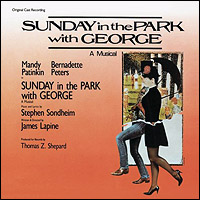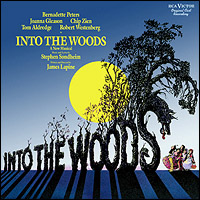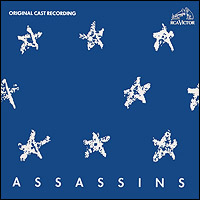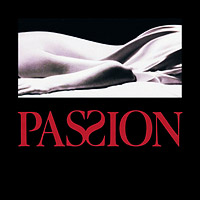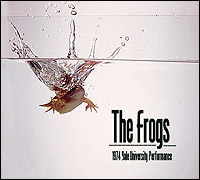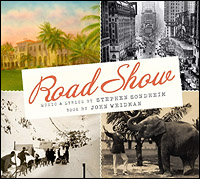*
Our three-part series discussing the original cast albums of Stephen Sondheim musicals — which began in our column of March 14 and continued with our March 21 column — has followed the master's Broadway career from West Side Story in 1957 through Merrily We Roll Along in 1981. This column discusses his later shows as well as a few other items written along the way.
Following the rude and vituperative reception accorded Merrily We Roll Along, Stephen Sondheim seems to have found himself metaphorically stranded in a city of strangers, a city of rusty fountains and dusty trees with battered barks lined by postered walls with crude remarks — some of them about Merrily We Roll Along. While the composer has been justly celebrated and appreciated in the musical theatre world for decades now, this was not always the case. The Sondheim/Prince shows, beginning with Company and Follies, rejuvenated what was at the time a moribund musical theatre and almost singlehandedly (or four-handedly?) propelled us into a brave new world. But as always there were traditionalists who found plenty to carp about: music which they found harsh and modernish, with nary a pretty tune; lyrics which they saluted as nimbly dexterous but outspoken and vulgar; subject matter which they found downbeat, unpalatable and morally distasteful. Challenge these audiences with something nobly artistic like Pacific Overtures and they will nod wisely and say, "you see"; give them a bloodbath like Merrily We Roll Along and they take out their knives and razor strops. Win Tony Awards for best score three seasons in a row — as Sondheim did in 1971, 1972 and 1973, totally annihilating what passed for competition — and you are likely to fuel eventual retribution. Reasonable minds will say, "but let's not overlook the fact that this guy wrote Follies and A Little Night Music and Sweeney Todd." Reasonable minds, yes; but when your newest musical flops in two weeks (as Merrily did), New York can be a city of strangers.
Hal Prince, who already had Evita on the boards and Phantom of the Opera 'round the corner, moved on to a different stage of his career. For Sondheim, it wasn't so easy; almost all of his shows — with the exceptions of Gypsy and the relatively minor Anyone Can Whistle and Do I Hear a Waltz? — had been produced by Prince. The Broadway musical as he knew it had more or less dried up; where was Sondheim to go in the world of Dreamgirls and Nine? An answer suddenly appeared in the person of James Lapine. Unlike Prince and Robbins, who had forged their careers in the theatre, Lapine was a photographer and visual artist; his early work (the play, Table Settings, William Finn's musical March of the Falsettos) incorporated an affinity for imagery and movement. What's more, Lapine's background was not in the commercial build-a-show-for Broadway world of the Sondheims and Princes, but in the non-profit, develop-a-show-till-it's-ready realm of Andre Bishop's Playwrights Horizons and Joe Papp's New York Shakespeare Festival.
Lapine was, thus, a new type of collaborator for Sondheim; and
Sunday in the Park with George was a new type of collaboration. Rather than taking an existing play or book as source material, the idea sprang from thin air — or, rather, from a painting. A painting by, and some biographical details about, the artist Georges Seurat. This was an unusual show for Sondheim, and an unusual show for Broadway; it won the Pulitzer Prize, on the one hand, but failed to attract a large audience and unfathomably-but-understandably lost the Best Score and Best Musical Tonys to an old-fashioned, unchallenging crowd pleaser. Favorite moments: "Sunday in the Park with George," unusual and adventurous musical theatre-writing on a grand canvas. "Finishing the Hat," a brilliant character study in which Sondheim illustrates the inner artist (as in Seurat
and Sondheim). "We Do Not Belong Together," a musical argument that develops with great melodic strength. "Sunday," a shimmeringly beautiful number which serves as a counterpart to the title song and positively soars. "Putting It Together," which treats art and creation almost pointillistically.
Sondheim and Lapine followed
Sunday in the Park with the similarly challenging, if ultimately more successful,
Into the Woods. Again the collaborators created their own little world, borrowing a few fairy tale characters and weaving them into a modern-day parable: "Children Will Listen," or perhaps they won't. Favorite moments: the grand, extended title sequence which opens the show. "I Know Things Now," Riding Hood's coming-of-age song. "Giants in the Sky," Jack's coming-of-age song. "A Very Nice Prince," a lesson in comparative monarchs. "Agony," a male duet that serves as counterpart to
Night Music's "In Praise of Women." "It Takes Two," a trippingly delightful duet for the Baker and his Wife. "Any Moment" ("Anything Can Happen in the Woods"), another playfully bright lark where Sondheim mixes his stories. "Last Midnight," where Sondheim's witch starts to tie the threads into a grand strand. And "No One Is Alone," a hopeful anthem, Sondheim-style.
With the original productions of both
Sunday in the Park and
Into the Woods meeting mixed receptions and unprofitable Broadway runs, Sondheim moved further from the mainstream with
Assassins (1991). A musical investigating and immortalizing presidential assassins? Okay, why not? Sondheim and collaborator John Weidman (of
Pacific Overtures) had things to say and points to make, which they did in a provocative manner. Playwrights Horizons mounted the show for a nine-week non-commercial run; given the time and place and politico-economic situation, the expected Broadway transfer did not materialize.
Assassins did finally make it uptown in 2004, when the Roundabout produced the show at Studio 54. This leaves us with two cast recordings, each with plenty to offer (thanks in part to fine performers on both occasions). In this case I suppose I slightly favor the revival album, in part because it contains an important song — "Something Just Broke" — which was first heard in the 1992 London production. Favorite moments: Well, the score of
Assassins doesn't fall into what I would call favorite moments. It is all of a piece, and a brave and uncompromising piece it is.
Sondheim and Lapine (of
Sunday in the Park and
Into the Woods) returned to Broadway with the very different
Passion (1994). Here I go out on a limb, as I have in the past when discussing this show.
Passion received a bumpy and problematic production, with a public reception somewhere along the lines of
Anyone Can Whistle and
Merrily We Roll Along. Yes, the show managed to win a clutch of awards — the competition consisting of
Beauty and the Beast and the Hollandaise
Cyrano — but it was loudly rejected even by many Sondheim fans, closing after a forced seven-month run. No matter; this is top-grade Sondheim, a rich, luscious and emotional score. Hopefully
Passion, like
Candide, will one day get its due. CD-wise, again, there is a conflict; the original cast album (headed by Donna Murphy) is our primary choice. However, the 1996 London cast album (headed by Maria Friedman) includes the climactic version of "No One Has Ever Loved Me," which — musically — finishes the score. Favorite moments, again, are superfluous.
And that, to date, is the last new Sondheim musical to reach Broadway. There have been anthology revues and revivals galore. Plus an old show which, in a revised version, finally came in.
The Frogs (1974) was not intended for Broadway; it was written by Sondheim and his old pal Burt Shevelove (of
A Funny Thing) as a site-specific entertainment, the site being the Payne-Whitney Swimming Pool at Yale University. Where the show was memorable, not quite workable, and very — unusual? The piece was dusted off for a 2000 concert version as part of Sondheim's 70th birthday celebration at the Library of Congress, starring Nathan Lane and Brian Stokes Mitchell. A full recording, finally, demonstrated the strengths of the score. Mr. Lane saw fit to devise a new, fuller version of the piece, with additional songs from the composer, which was produced by Lincoln Center Theater in 2004. The resulting CD, I suppose, we can include in our list of original Broadway cast albums of Sondheim musicals. Favorite moments: "Invocation and Instructions to the Audience," which importunes the Lincoln Center subscribers to "Please don't fart — there's very little air and this is art." Well, Shakespeare it's not, nor Shaw; but that's a plot point. "I Love to Travel" is one of the bright new songs written for 2004, as is "Hades." "Ariadne," another new song, is one of those tender beauties that stand out in the Sondheim song catalogue. "The Frogs," from the original version, remains great fun — "brek-kek-kek-kek!" — while "Evoe," the Hymn to Dionysus, also takes a spot on the favorites list.
Standing highest among the varied Sondheim revues is the first, Side by Side by Sondheim (1976 in London, 1977 in New York). Coming on the heels of the challenging Pacific Overtures, I noticed a distinct warming towards the composer from that portion of the Broadway audience which had formerly found his music "too specialized." (I was so surprised — and so pleased — by an early preview that I bought into the show, with profitable results. Those were the days, when producers were happy to get a $1,000 investment!) Marry Me a Little (1981), an intimate Off-Broadway show which first brought Craig Lucas (from the chorus of Sweeney Todd) to prominence, recycled cut and unused material from various sources. Putting it Together, a follow-up from the Side by Side by Sondheim people, stubbornly refused to find success — in England (1992), Off-Broadway with Julie Andrews (1993), and in full Broadway guise with Carol Burnett (1999). Another revue, Sondheim on Sondheim — created by James Lapine — is at present previewing in preparation for an April 22 opening.
Miscellaneous Sondheim items of interest have come along over the years.
Saturday Night (1955), an unproduced musical that pre-dates
West Side Story, was finally mounted at Off-Broadway-scale venues in London in 1997 and New York in 2000. Back in 1966, while Sondheim was waiting around for "The Girls Upstairs" (aka
Follies), he wrote the television musical
Evening Primrose. The soundtrack album is brief but highly recommended; four wonderful songs which serve as an introduction to the age of Sondheim as we know it. Also highly recommended is the soundtrack for the 1974 Alain Resnais film,
Stavisky. I've been listening to this repeatedly, and happily, while writing this column. Which leads us to
Road Show, a musical about the brothers Addison and Wilson Mizner. Sondheim had long been fascinated by the 1953 dual biography of the Florida architect and his fight promoter/playwright/conman brother; as a novice composer, he lost out on the rights to the source material to Irving Berlin, no less. In 1993, Sondheim finally moved ahead, collaborating once more with John Weidman. The material would prove tantalizingly stubborn, with no less than three first-rank directors — Sam Mendes, Hal Prince, John Doyle — working on the piece. Along the way, two cast albums were made:
Bounce, the 2003 Prince version, which was mounted in major productions at the Goodman in Chicago and the Eisenhower at the Kennedy Center; and
Road Show, which Doyle brought Off-Broadway to the Public Theater in 2008. While it can be said that the show never reached optimal form, Sondheim's most recent work — best represented on the
Road Show CD — ranks among the finest theatre scores of the decade. Favorite moments: "Waste," an intriguing opening number that addresses the challenges of the piece head on. "Gold," in which Sondheim demonstrates how he will develop his score out of interwoven and altered musical themes. "Addison's Trip," a marvel of plot-development and musical story-telling. "Isn't He Something!," the mother's song. "Talent," "You" and "The Best Thing That Ever Happened"; well, they all intermesh, and they well represent our finest and most incisive composer/lyricist/musical theatre dramatist.
And that's where we are, Sondheim after 80 years (and after 53 on Broadway): West Side Story, Gypsy, A Funny Thing Happened on the Way to the Forum, Anyone Can Whistle, Do I Hear a Waltz?, "Evening Primrose," Company, Follies, A Little Night Music, "Stavisky," The Frogs, Pacific Overtures, Sweeney Todd, Merrily We Roll Along, Sunday in the Park with George, Into the Woods, Assassins, Passion , Road Show. Happy listening, and happy birthday.
(Steven Suskin is author of the recently released updated and expanded Fourth Edition of "Show Tunes" as well as “The Sound of Broadway Music: A Book of Orchestrators and Orchestrations,” "Second Act Trouble," and the "Opening Night on Broadway" books. He can be reached at [email protected].)
* Steven Suskin's updated and expanded fourth edition of "Show Tunes" is available at PlaybillStore.com.
